Firefighting school is no small feat. It requires immense courage, physical and mental fortitude, and a deep understanding of the principles and practices of firefighting.
Understanding what challenges lie ahead can help aspiring firefighters make an informed decision about whether or not firefighting is right for them. This article explores the difficulty of firefighting school and provides insights into why it may be more challenging than you think.
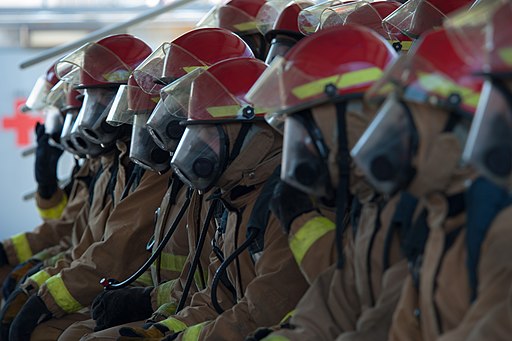
Achieving readiness: Sailors attentively listen to a safety briefing at the Center for Naval Engineering Firefighting School at Naval Base San Diego. The comprehensive training includes classroom instruction, hands-on hose handling, shipboard firefighting and learning to use specialized equipment.
Fire Academy Training
A firefighting school, also known as a firefighter academy, is a specialized training program designed to prepare firefighters for their job. It consists of academic and practical components, such as physical fitness, emergency medical care, hazardous materials handling, team building, and leadership skills.
Challenges in the Fire Service
Firefighter training is a physically and mentally demanding process that prepares individuals to handle dangerous situations with poise and skill. Training often consists of tests and exercises that develop strength and endurance, build psychological resiliency, and teach technical skills. It’s an important job, and firefighters must be prepared to handle any situation.
Strength and Endurance
Strength and endurance tests are standard in firefighter training. These can range from physical fitness assessments that involve running, push-ups, sit-ups, squats, pull-ups, or other exercises; to carrying heavy loads over long distances; to completing obstacle courses or drills in full gear. All these activities require strength and endurance to ensure that firefighters can perform their duties effectively in the field.
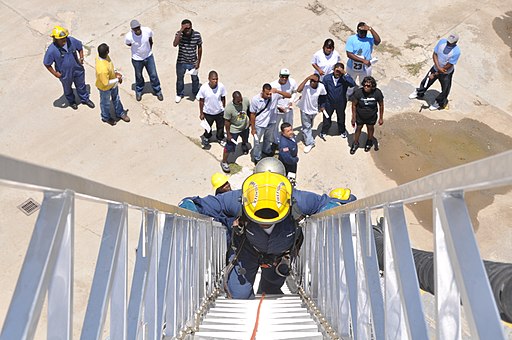
A Guantanamo Bay Fire Department firefighter demonstrates his strength and agility as he climbs a ladder during the aerial climb portion of the agility test.
It’s estimated that firefighters are up to 50% stronger than the average person due to the rigorous physical demands of their job. This increased strength helps them navigate difficult terrain while carrying heavy equipment with ease.
Psychological resilience
Firefighter training also focuses on building psychological resiliency through various exercises designed to prepare firefighters for emotionally charged situations they might encounter on the job. These may include role-playing scenarios designed to help them understand how to respond to extreme stress or danger.
Firefighters also learn to recognize when they’re feeling overwhelmed so they can take proactive steps toward reducing their stress levels before they become too high. The fire academy teaches students how to remain calm under pressure and self-regulate their emotions so they can focus on the task without letting fear overwhelm them.
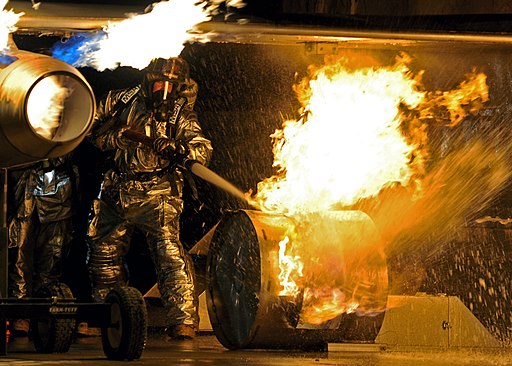
Firefighters from the 386th Expeditionary Civil Engineer Squadron put their skills to the test during a two-day live-fire training using a Mobile Aircraft Firefighter Trainer, simulating a C-130 Hercules aircraft fire at a U.S. military installation.
Technical Skills
Technical skills training is a key part of firefighter preparation as well. Firefighters must be knowledgeable about fire safety protocol and first aid techniques to do their jobs adequately.
They need to know how to use specialized equipment like respirators correctly. Misusing specialized equipment could put themselves and others at risk during an emergency. As such, all recruits must go through a comprehensive training program, where they learn all the ins and outs of firefighting so they can safely carry out their duties once they’re out in the field later on.
What makes firefighting school hard?
Training in a fire academy is not easy. It requires a great deal of hard work and dedication to become an effective firefighter. Given the rigorous requirements and limited resources, it can be hard to complete firefighting training.
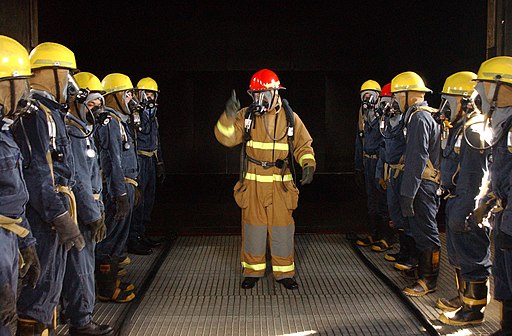
Machinist’s Mate 1st Class Timothy B. Golden, imparts last-minute instructions to his students before they put their newly acquired skills to the test in a training simulator at the Farrier Firefighting School, Naval Station Norfolk.
Fierce Competition
Firefighters usually undergo a meticulous hiring process before being accepted into firefighting school. Requirements can vary depending on the district or state, but they often include written tests, physical tests, background checks, and interviews.
Most fire departments require applicants to have at least a high-school diploma or equivalent, a valid driver’s license, a paramedic’s license, an EMT certification, and other relevant coursework or certification.
Lengthy Coursework
For starters, the coursework requirements in a fire academy are relatively lengthy. Aside from traditional academic courses such as math, science, and English, recruits must also learn about hazardous materials safety, building construction, ladder raise, emergency medical services, fire scene protection, fire suppression tactics, search and rescue operations, and more.
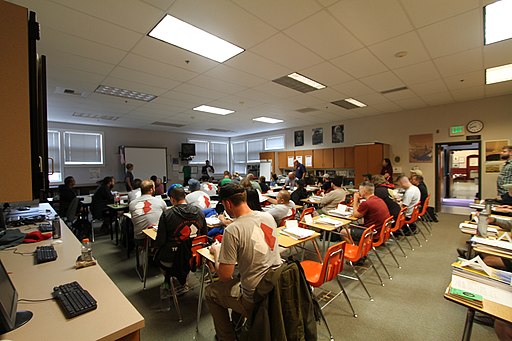
Students in an S-130 Basic Firefighter Training class attentively listen to instructors as they share real-life case studies and personal experiences.
Rigorous examinations
Potential trainees must also pass written and physical examinations to move forward with their training. To become a firefighter, you need to pass a physical ability test which typically involves climbing stairs while carrying equipment, dragging hoses, and simulating rescue efforts.
Long hours
Numerous hours are required for practical experience to gain competency in all relevant areas. The training can often be difficult for those with demanding full-time jobs or busy family lives who may not have enough time outside their regular commitments.
Limited access
Access to instructors and resources is also limited in some places due to budget constraints or lack of qualified personnel, making it sometimes challenging to secure the necessary guidance during training.
Financial Burden
Paying for tuition at a college-based fire academy can be expensive for some people who want to be firefighters. It can also be a challenge for fire departments if they don’t have enough money or resources. This situation can be especially true when budgets are tight, and funding is limited.
7 Strategies for Overcoming the Challenges in a Fire Academy training
Success in a fire academy is achievable with the right strategies and a positive attitude. Here are some tips for studying and succeeding in firefighting school:
1. Develop a training plan with goals before starting the program
Before beginning classes, it’s important to develop a training plan that outlines your goals for the program and how you plan to achieve them. Include academic and physical objectives, such as passing all exams or running a certain distance each day. Having clearly-defined goals will help keep you motivated during each step of your training.
2. Utilize online learning tools for academic coursework
Most firefighting schools offer online learning tools to supplement their curricula, making it easier to access material outside of class time and review concepts that may be difficult to understand. Take advantage of these resources to stay on top of coursework and ensure that you’re fully prepared for each exam.
3. Create a support network of fellow trainees and mentors for guidance and motivation
If possible, seek out trainees who have already completed their schooling or mentors who have experience in the field, as they can provide invaluable guidance throughout your training process. Having peers or mentors to discuss concepts with and ask questions about assignments can be incredibly helpful in keeping you focused and motivated throughout fire academy training.
4. Prioritize physical fitness
Firefighters must be physically fit to carry out their responsibilities safely and effectively once they enter the field. Make sure you complete physical fitness tests throughout your training program to hit your targets by graduation day.

Senior Airman John Barron runs on the treadmill at a gym. Firefighters must adhere to a higher standard of physical fitness to be proficient in their duties.
5. Stay organized
Keeping up with course assignments while attending classes can be tricky at times – especially when it comes to memorizing all the different techniques taught in class. Use organizational tools like planners or digital calendar apps so that you never miss an assignment due date or forget what was taught in class last week.
6. Take time away from school work
You may easily burn out if you don’t take enough time away from your studies now and then. Make sure you take regular breaks from studying so that when it’s time for class again, you come back refreshed and ready to learn.
7. Maintain a healthy diet and exercise regimen
Eating well-balanced meals regularly throughout the day will help fuel your body with essential vitamins and minerals while providing sustained energy boosts throughout long days in class or studying late into night hours.
Joining a firefighting school or fire academy is a challenging yet rewarding pathway for those who want to become a firefighter. Anyone considering this profession should assess their ability to meet the challenges associated with completing firefighting school before making any commitments. With the right preparation and dedication to their studies, aspiring firefighters may enjoy a challenging but rewarding career path in this field.


